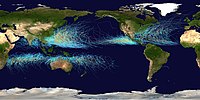
Biofouling of a unionid mussel by dreissenid mussels in nearshore zones of the Great Lakes
Sign Up to like & getrecommendations! Published in 2022 at "Ecology and Evolution"
DOI: 10.1002/ece3.9557
Abstract: Abstract In North America, native unionid mussels are imperiled due to factors such as habitat degradation, pollution, and invasive species. One of the most substantial threats is that posed by dreissenid mussels, which are invasive… read more here.
Keywords: biofouling; dreissenid mussels; bay; mussel ... See more keywords

Historical niche partitioning and long‐term trophic shifts in Laurentian Great Lakes deepwater coregonines
Sign Up to like & getrecommendations! Published in 2018 at "Ecosphere"
DOI: 10.1002/ecs2.2080
Abstract: Over the last 100 yr, anthropogenic stressors have decimated the assemblage of deepwater coregonines that once underpinned the food webs of the Laurentian Great Lakes. As a part of ongoing restoration efforts, fisheries managers are… read more here.
Keywords: trophic niche; laurentian great; deepwater coregonines; niche ... See more keywords

Micronuclei and other erythrocyte nuclear abnormalities in fishes from the Great Lakes Basin, USA
Sign Up to like & getrecommendations! Published in 2017 at "Environmental and Molecular Mutagenesis"
DOI: 10.1002/em.22123
Abstract: Biological markers (biomarkers) sensitive to genotoxic and mutagenic contamination in fishes are widely used to identify exposure effects in aquatic environments. The micronucleus assay was incorporated into a suite of indicators to assess exposure to… read more here.
Keywords: erythrocyte nuclear; micronuclei erythrocyte; nuclear abnormalities; erythrocyte abnormalities ... See more keywords

Identifying Chemicals and Mixtures of Potential Biological Concern Detected in Passive Samplers from Great Lakes Tributaries Using High‐Throughput Data and Biological Pathways
Sign Up to like & getrecommendations! Published in 2021 at "Environmental Toxicology and Chemistry"
DOI: 10.1002/etc.5118
Abstract: Abstract Waterborne contaminants were monitored in 69 tributaries of the Laurentian Great Lakes in 2010 and 2014 using semipermeable membrane devices (SPMDs) and polar organic chemical integrative samplers (POCIS). A risk‐based screening approach was used… read more here.
Keywords: chemistry; identifying chemicals; great lakes; toxicology ... See more keywords

Risk‐Based Prioritization of Organic Chemicals and Locations of Ecological Concern in Sediment From Great Lakes Tributaries
Sign Up to like & getrecommendations! Published in 2022 at "Environmental Toxicology and Chemistry"
DOI: 10.1002/etc.5286
Abstract: With improved analytical techniques, environmental monitoring studies are increasingly able to report the occurrence of tens or hundreds of chemicals per site, making it difficult to identify the most relevant chemicals from a biological standpoint.… read more here.
Keywords: toxicology; chemistry; chemicals locations; risk based ... See more keywords

Prioritizing Pharmaceutical Contaminants in Great Lakes Tributaries Using Risk‐Based Screening Techniques
Sign Up to like & getrecommendations! Published in 2022 at "Environmental Toxicology and Chemistry"
DOI: 10.1002/etc.5403
Abstract: In a study of 44 diverse sampling sites across 16 Great Lakes tributaries, 110 pharmaceuticals were detected of 257 monitored. The present study evaluated the ecological relevance of detected chemicals and identified heavily impacted areas… read more here.
Keywords: toxicology; chemistry; lakes tributaries; pharmaceutical concentrations ... See more keywords

Prioritizing Pesticides of Potential Concern and Identifying Potential Mixture Effects in Great Lakes Tributaries Using Passive Samplers
Sign Up to like & getrecommendations! Published in 2022 at "Environmental Toxicology and Chemistry"
DOI: 10.1002/etc.5491
Abstract: To help meet the objectives of the Great Lakes Restoration Initiative with regard to increasing knowledge about toxic substances, 223 pesticides and pesticide transformation products were monitored in 15 Great Lakes tributaries using polar organic… read more here.
Keywords: toxicology; chemistry; lakes tributaries; tributaries using ... See more keywords

Synoptic climatology of lake‐effect snowfall conditions in the eastern Great Lakes region
Sign Up to like & getrecommendations! Published in 2017 at "International Journal of Climatology"
DOI: 10.1002/joc.5093
Abstract: The characteristics of overlying synoptic conditions play an important role in the production of lake-effect snowfall within the Great Lakes region of North America. With a synoptic climatological approach, the synoptic-scale patterns conducive to lake-effect… read more here.
Keywords: effect snowfall; lake effect; climatology; effect ... See more keywords

Use of Fish Telemetry in Rehabilitation Planning, Management, and Monitoring in Areas of Concern in the Laurentian Great Lakes
Sign Up to like & getrecommendations! Published in 2017 at "Environmental Management"
DOI: 10.1007/s00267-017-0937-x
Abstract: Freshwater ecosystems provide many ecosystem services; however, they are often degraded as a result of human activity. To address ecosystem degradation in the Laurentian Great Lakes, Canada and the United States of America established the… read more here.
Keywords: laurentian great; areas concern; use fish; management ... See more keywords

On the role of snow cover ablation variability and synoptic-scale atmospheric forcings at the sub-basin scale within the Great Lakes watershed
Sign Up to like & getrecommendations! Published in 2018 at "Theoretical and Applied Climatology"
DOI: 10.1007/s00704-018-2414-8
Abstract: Synoptic-scale atmospheric conditions play a critical role in determining the frequency and intensity of snow cover ablation in the mid-latitudes. Using a synoptic classification technique, distinct regional circulation patterns influencing the Great Lakes basin of… read more here.
Keywords: synoptic scale; ablation; cover ablation; snow cover ... See more keywords

Stakeholder attitudes towards the use of recombinant technology to manage the impact of an invasive species: Sea Lamprey in the North American Great Lakes
Sign Up to like & getrecommendations! Published in 2018 at "Biological Invasions"
DOI: 10.1007/s10530-018-1848-3
Abstract: Several factors, including: (1) on-going difficulties of cost-effectively managing invasive species; (2) recent successes in using recombinant genetics to suppress mosquito populations; and, (3) developments in gene-drive technology, have re-invigorated interest in using genetic biotechnology… read more here.
Keywords: sea lamprey; invasive species; north american; technology ... See more keywords